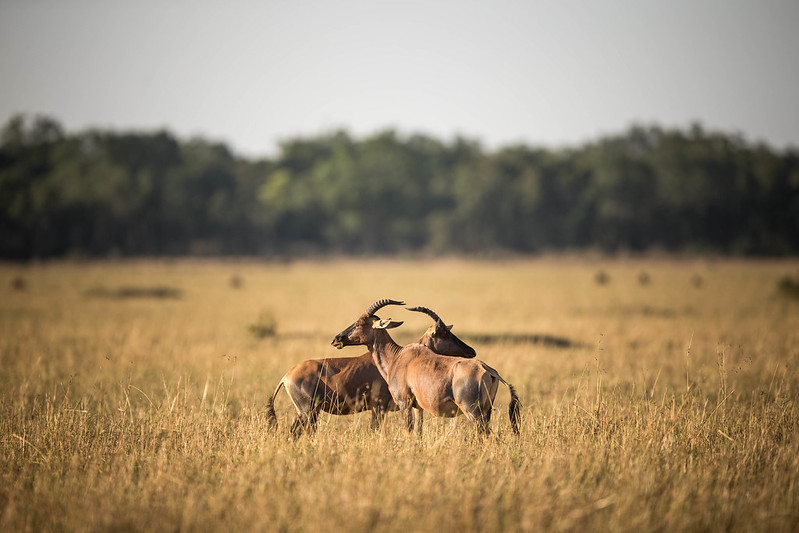Global Law Alliance Joins Letter Objecting to Catastrophic Kenyan Mining Operation
Wildlife in jeopardy from mining proposal

Wildlife organizations and environmental law practitioners from across the globe have come together to request that the Kenyan government block a mining project which could have major implications for wildlife in the Tana River Delta. The Global Law Alliance for Animals and the Environment (GLA) signed onto the letter.
In mid-November, Base Titanium, a subsidiary of Base Resources, applied to the Kenyan government for a mining permit to harvest ilmenite, zircon, and rutile in Tana River and Lamu counties, where the Tana River Delta is located. The ecologically rich and biodiverse delta is home to a multiplicity of wildlife species, including African elephants, five species of marine turtles, critically endangered dugongs and coastal topi, and numerous migratory bird species. The region is also an area of ecological significance, designated as a Key Biodiversity Area, an Important Bird Area, and a Wetland of International Importance. The scope of the mining project will infringe on these protected areas, putting wildlife in jeopardy of habitat degradation, increased conflict with humans, and extinction.
Similar Base Resources mines foretell the devastation that could be wrought if Kenya permits mining operations in the Tana River Delta. For example, in Madagascar, mining operations have been suspended due to local activism and concern about the community’s right to a healthy environment. Experts have observed human and non-human animal health and ecosystem consequences as a result of the project. Mining for ilmenite, zircon, and rutile emits radioactive elements into the air and environment, including thorium, a particularly harmful radioactive metal. Studies have found that thorium causes lung damage, reproductive complications, and other hematological and pulmonary effects in humans and non-human animals.
In a letter to the Kenya Minister of Mining, Blue Economy, and Maritime Affairs, wildlife activists from across the world objected to the Tana River Delta mining application, advocating that the project infringes on Kenya’s commitments under several international laws. The letter argues that the project will adversely impact goals under the Convention on Biological Diversity (CBD), the Ramsar Convention, and the African-Eurasian Waterbird Agreement (AEWA), in which Kenya has committed to various wildlife and habitat conservation measures. Because locals will become exposed to radioactive elements released during mining, the letter also alleges that the project will violate the United Nations Universal Declaration of Human Rights (UDHR) and the Rio Declaration on Environment and Development, which affirm the right to a healthy environment.
GLA signed the letter in support of the objections in line with its mission to uphold implementation and enforcement of international law. GLA has a long history of working with environmental NGOs to protect wildlife through international law. Last year, GLA clinic students worked on another Ramsar Convention issue, contributing toa report analyzing the legal pathways to address the impacts of agricultural runoff on wetland health.
Organizers of the objection submitted the letter to the Ministry of Mining, Blue Economy, and Maritime Affairs on Friday, Dec. 6. The Ministry has yet to rule on the status of the application, but conservationists are hopeful that the letter will persuade the government to deny the application in favor of protecting wild animals and the vital ecosystem on which they depend.
This blog was co-written by Ally Grimaldi, Diehl Fellow for the Global Law Alliance for Animals and the Environment and Erica Lyman, Clinical Professor and Director of the Global Law Alliance for Animals and the Environment.
Ally is a 2024 JD graduate of the Environmental and Animal Law programs. Prior to attending law school, Ally earned her Bachelor’s in Environmental Studies and Political Science from the University of Oregon Clark Honors College, where she graduated summa cum laude.

The Center for Animal Law Studies (CALS) was founded in 2008 with a mission to educate the next generation of animal law advocates and advance animal protection through the law. With vision and bold risk-taking, CALS has since developed into a world-renowned animal law epicenter. CALS’ Alumni-in-Action from 30 countries are making a difference for animals around the world. CALS is a self-funded Center within the law school operating under the Lewis & Clark College 501(c)(3) tax-exempt status, and is able to provide these educational opportunities through donations and grants.
Center for Animal Law Studies is located in Wood Hall on the Law Campus.
MSC: 51
email cals@lclark.edu
voice 503-768-6960
Center for Animal Law Studies
Lewis & Clark Law School
10101 S. Terwilliger Boulevard MSC 51
Portland OR 97219
More Stories

Companion Animal Law Evolves to Protect People and Their Pets
Lewis & Clark sparks a national movement to protect both people and their pets by redefining the role of companion animals in the legal system.

Protecting Farmed Animals in Memory of Thomas Bloom Raskin
Megan Rosen, LLM Candidate, Named Inaugural Recipient of the Thomas Bloom Raskin Animal Protection Scholarship

Manure Biogas is All Hat and No Cattle
Miranda Herreid, a JD student in the Farmed Animal Protection Project, breaks down why manure biogas is not the solution and will further entrench factory farming.

Moo Deng Highlights the Plight of Pygmy Hippos
Behind the viral memes lies the opportunity for an important conversation about wild animal protection
